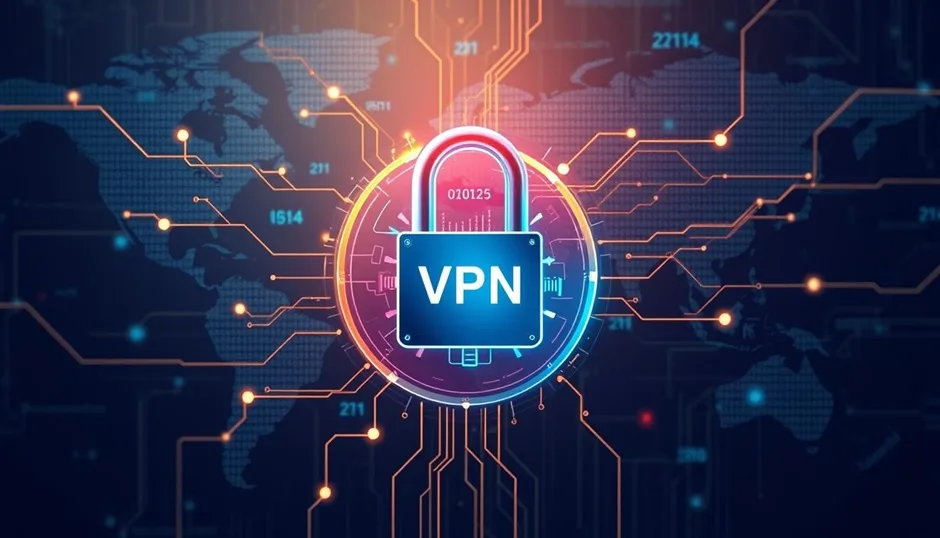In today’s digital world, protecting your online activities is more important than ever. Choosing the right VPN service is key to keeping your internet use private and secure. With threats like data theft and surveillance lurking everywhere, a good VPN is your first line of defense. A recent survey shows a growing need for privacy tools, with the best free VPNs at the forefront.
Virtual Private Networks, or VPNs, play a crucial role in hiding your IP address and encrypting your data. This makes your online presence safer from unauthorized access. It’s especially useful for safe browsing and prevents data breaches when streaming. Additionally, a VPN can help bypass geo-restrictions and avoid bandwidth throttling, making streaming content worldwide accessible.
While there are many options available, the distinction between free and paid VPNs is significant. Free VPNs might appeal to those who want to protect their online privacy without spending money. A detailed report on VPN technology highlights their benefits for web browsing and streaming. User reviews also provide valuable insights, helping you choose the best free VPN for your needs.
Key Takeaways
- The increasing necessity of VPNs for protecting user data and enhancing Internet privacy.
- A VPN’s ability to mask your IP and encrypt data transfer ensures more secure online activity.
- Benefits of using a VPN for streaming, including bypassing geo-blocks and preventing bandwidth throttling.
- Understanding the differences between free and paid VPN options to make informed choices.
- The importance of user-generated testimonials in discerning the best free VPN service.
Understanding the Fundamentals of VPNs for Online Privacy
With digital surveillance and data breaches on the rise, it’s vital to grasp VPN basics for online privacy. A Virtual Private Network (VPN) acts as a crucial shield, encrypting data and concealing user identities online. This makes your activities nearly impossible to trace.VPN technology creates a secure tunnel for data transmission. This tunnel encrypts data, preventing outsiders from intercepting or reading it. It uses advanced encryption protocols to block unauthorized access and safeguard data integrity.
What is a VPN and How Does It Safeguard Your Data?
A VPN essentially builds a secure network connection on public networks. It routes your internet connection through its private server, not your ISP. This ensures your data is sent and received securely and anonymously. It’s essential for protecting your online privacy and safeguarding your data from cyber threats.
The Role of Encryption in Protecting Your Online Activities
Encryption is the core of any VPN service. Protocols like SSL/TLS and IPSec turn readable data into an unbreakable code during transmission. Encryption is more than technology; it’s a promise that your online activities, from banking to communication, are safe from eavesdroppers and hackers.
As cyber threats evolve, the need for strong encryption in VPNs grows. It not only prevents data breaches but also builds trust in digital platforms. This enhances overall online security significantly.
Identifying the Best Free VPN for Your Needs
Exploring the vast array of free VPN extensions can be overwhelming. It’s essential to pick a service that conceals your online identity and performs well. We delve into critical aspects of free VPNs to guide you in choosing the right one for safe browsing and streaming. This includes evaluating speed, server networks, and understanding the VPN’s privacy policy.
Assessing Speed and Performance of Free VPN Services
The speed of a VPN service greatly affects your online activities. Slow speeds can ruin your browsing and streaming. Top free VPNs aim to offer decent speeds without charging a fee. Conducting speed tests before using them daily helps gauge their performance.
By examining speed test results and reviews, you can identify which free VPNs balance speed with security.
Comparing Bandwidth Limitations and Server Availability
Free VPNs vary significantly in their server networks and bandwidth policies. Some offer unlimited bandwidth, a feature usually reserved for paid services. Wide server availability enhances geo-spoofing and speeds, thanks to lower server loads. Yet, it’s crucial to check the bandwidth limits of popular free VPNs.
Knowing these limits prevents unexpected streaming interruptions.
Read the Fine Print: Privacy Policies of Free VPN Providers
The privacy policy of a free VPN is paramount. Industry experts stress the importance of these policies. Key aspects to examine include data retention, sharing with third parties, and the VPN’s jurisdiction. Understanding these details ensures you choose a VPN that respects your online privacy.





